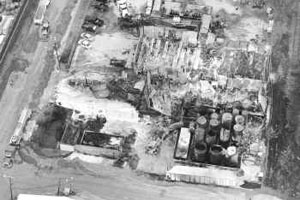UK - FIRE ON BP FLOATING OIL PRODUCTION VESSEL

Oil major BP shut in 120,000 barrels per day of crude oil output at its
North Sea Schiehallion oilfield on Friday after a fire in staff facilities
at the field, a BP spokeswoman said. BP shut in production and evacuated
49 non-essential staff from the Schiehallion facility after the fire broke
out at around 0415 GMT on Friday, she said.The fire was in the staff utility
room on the Schiehallion floating production, storage and offloading (FPSO)
vessel, she said. "As a precaution the vessel was called to muster
and production was shut in," she said.
Schiehallion crude is often loaded with Brent crude on tankers for export
to refiners in the United States. London Brent crude rose to $59.77 a
barrel after news of the fire, but later fell back to $59.08. Prices had
also risen earlier after a fire at BP's 460,000 barrels per day Texas
City refinery in the U.S. on Thursday. The North Sea physical crude market
has already seen prices rocket in recent weeks as summer oilfield maintenance
eats into regional output.
The fire was quickly extinguished and nobody was hurt, the BP spokeswoman
added. It started in an air compression unit. BP could not say when production
from the facility will restart. The remaining 42 staff stayed on the vessel.
Those evacuated were taken by helicopter to the nearby Foinaven FPSO and
the drilling rig PBLJ in the area. They will later be evacuated to Aberdeen,
she said.
BP operates the Schiehallion field. Other equity holders in the field
are Shell, Amerada Hess, Statoil, Murphy Oil and OMV.
US - THE RISK OF ACCIDENT AT OIL REFINERIES AT OIL REFINERIES
THE US IS ON THE RISE AT PLANTS, RUNNING NEAR FULL THROTTLE, GET WORN
DOWN AHEAD OF SEASONAL MAINTENANCE IN THE FALL, ENERGY ANALYSTS SAID FRIDAY.
Fires broke out at two major oil refineries in the Gulf Coast Thursday,
including BP beleaguered refinery in Texas City. Experts said more problems
could arise after months of soaring refining activity. "This time
of year you always have things blow up," said an analyst at A.G.
Edwards in Chicago. "Refineries are getting stretched. Its part of
the landscape." Refinery outages can push up prices for gasoline
heating oil and crude by cutting into stockpiles in America, the world's
largest energy consumer.
Oil companies typically perform maintenance on refineries in the spring
and fall, when demand is low. They generally run them at high utilization
rates in the winter and the summer when demand is higher. This summer,
refineries have been running consistently over 90 percent of capacity
to meet robust gasoline demand and to top off distillates stockpiles,
like heating oil, ahead of the Northern Hemisphere winter. "Refineries
like to run full-out at this time of the year," said another analyst
at Ritterbusch & Associates. "We're between two periods of seasonal
maintenance, trying to build up distillates and keep up with gasoline
demand." "The good news is that these high refinery runs have
given us a distillate supply surplus. But we've seen erosion in the gasoline
surplus, and that surplus could be erased by mid to late August, especially
with refinery snags."
BP said Friday it was investigating the cause of a fire in a hydrotreater
unit at its Texas City, Texas, refinery Thursday that shut 60,000 barrels
per day of production. The Texas City refinery, the third largest in the
United States, was the site of a fatal explosion in late March that killed
15 workers and injured 170 others. Also on Thursday, Murphy Oil reported
a fire at its Meraux, Louisiana, refinery, forcing shut an 18,000 bpd
kerosene hydrotreater for an undetermined amount of time.
While neither incident was likely to have a significant impact on U.S.
gasoline or distillate inventories, market watchers said they underscored
the vulnerability of refineries at this time of year. "We're at a
stage now where if refineries are not running all out, we can't keep up
with demand. We don't have any supply cushion to help cushion increases
in demand," said an analyst for Cameron Hanover. U.S. gasoline and
distillate supplies are in or above the average range for this time of
the year, but demand has been holding strong in the face of high prices,
keeping strain on the market.
Over the past four weeks, gasoline demand has averaged 1.6 percent higher
than last year, while distillate demand has averaged 3.6 percent higher,
according to government figures.
View full story here
US - FORT WORTH CHEMICAL PLANT EXPLOSION INJURES 4

FORT WORTH
Firefighters turned over the site of a chemical plant explosion and blaze
to a private hazardous-materials abatement company on Friday. A Fire Department
spokesman said a full investigation of Thursday's fire would start only
after the cleanup of the Valley Solvents & Chemicals plant in North
Fort Worth was completed. He said it wasn't clear how long that would
take. "We're in no hurry," he said. "It's not going anywhere."
Officials with Denton-based Hulcher Services Inc., the firm hired to
clean up the site, could not be reached for comment. An employee at the
site Friday declined to talk about the cleanup. The company was building
large dirt berms around the plant to prevent contaminated water from reaching
adjacent properties or the city's storm sewer system. Smaller berms were
in place Thursday. The Fire Department spokesman said a small amount of
water containing some of the chemicals stored at the plant reached a storm
drain, but that was caught quickly and the drain was vacuumed.
Valley Solvents had 30 chemicals in 2,000 to 4,000 gallon tanks at its
facility when the fire started about 1:30 p.m. Thursday. Most were industrial
solvents such as acetone and isopropyl alcohol; however, there were more
dangerous chemicals such as hydrochloric acid at the facility, too, local
health officials said.
The company was building large dirt berms around the plant to prevent
contaminated water from reaching adjacent properties or the city's storm
sewer system. Smaller berms were in place Thursday. The Fire Department
spokesman said a small amount of water containing some of the chemicals
stored at the plant reached a storm drain, but that was caught quickly
and the drain was vacuumed.
There were no fatalities in the plant fire. Four people were taken to
local hospitals, and three were treated and released. A warehouse manager
who sustained burns over 30 percent of his body remained hospitalized
Friday, the fire Department spokesman said. Firefighters stayed at the
plant overnight to battle occasional flare-ups.
The owner of Valley Solvents, could not be reached Friday. City officials
said the fire apparently started when a tractor-trailer was delivering
highly flammable methanol to the plant near Northeast 33rd and Bethlehem
streets. Additional information about the cause of the fire, which spread
to other chemical tanks on the property, was not available.
The Fire Department spokesman said investigators will look at whether
the hoses used in the delivery were damaged and whether static electricity
could have been a factor. "Static electricity is a big concern. It's
an inherent danger" when delivering flammable chemicals, hesaid.
He also said that investigators also plan to talk to the truck driver
who was making the delivery. That driver could not be located Friday,
and officials at the trucking company where he worked could not be reached
for comment.
Fort Worth fire investigators took overhead photos of the plant Friday
and, while wearing hazard suits, walked a short distance into the grounds.
"Most of the evidence has been destroyed, but they [fire investigators]
are very skilled at determining what happened," the Fire Department
spokesman said.
The Occupational Safety and Health Administration also will investigate
the fire and explosion to determine whether emergency evacuation plans
were followed and how employees and contractors were handling the hazardous
chemicals. Officials with the Texas Department of State Health Services
said they would investigate only if there are numerous reports of health
problems that could be connected to the fire. The Red Cross and the city
of Fort Worth established two evacuation areas for nearby residents Thursday,
but only about 10 people took advantage of the shelter. One person with
existing respiratory problems was hospitalized. The city's top health
officials said it was unlikely that short-term exposure to the smoke would
cause any lasting damage.
Fort Worth officials were also dealing with a water main break within
a block of Valley Solvents on Friday morning that might have been caused
by the increased pressure through the line, a water department spokeswoman
said. "Water main breaks happen every day, so it's hard to say"
what caused Friday's, she said. "We do know we were putting more
pressure in that area to aid in firefighting." The water system sustained
no contamination, the spokeswoman said. She said a half-dozen businesses
in the area were left without water, but the pipe was expected to be repaired
by Friday afternoon. |



